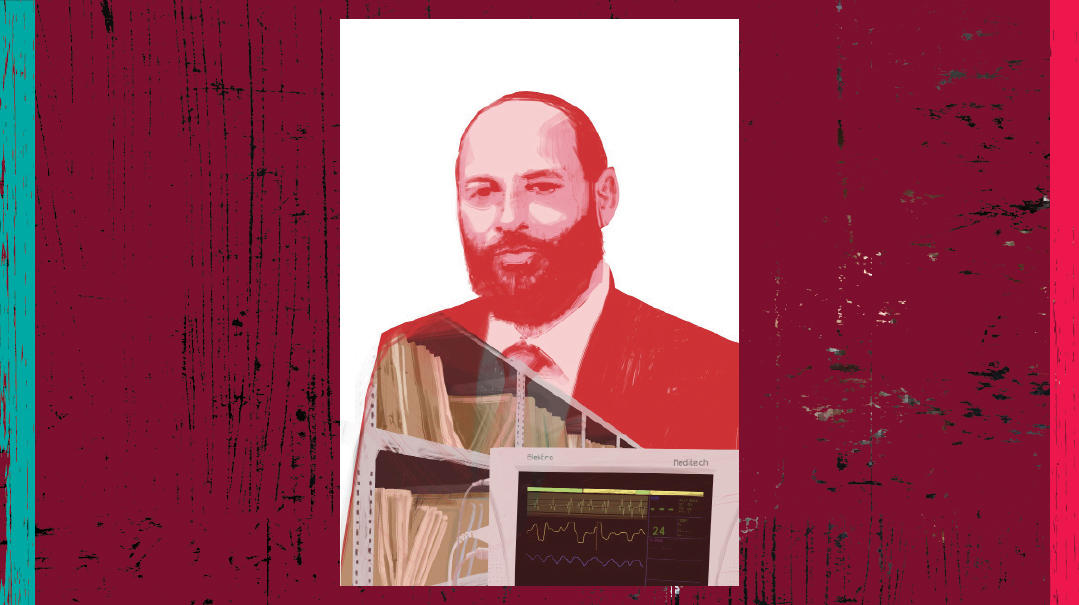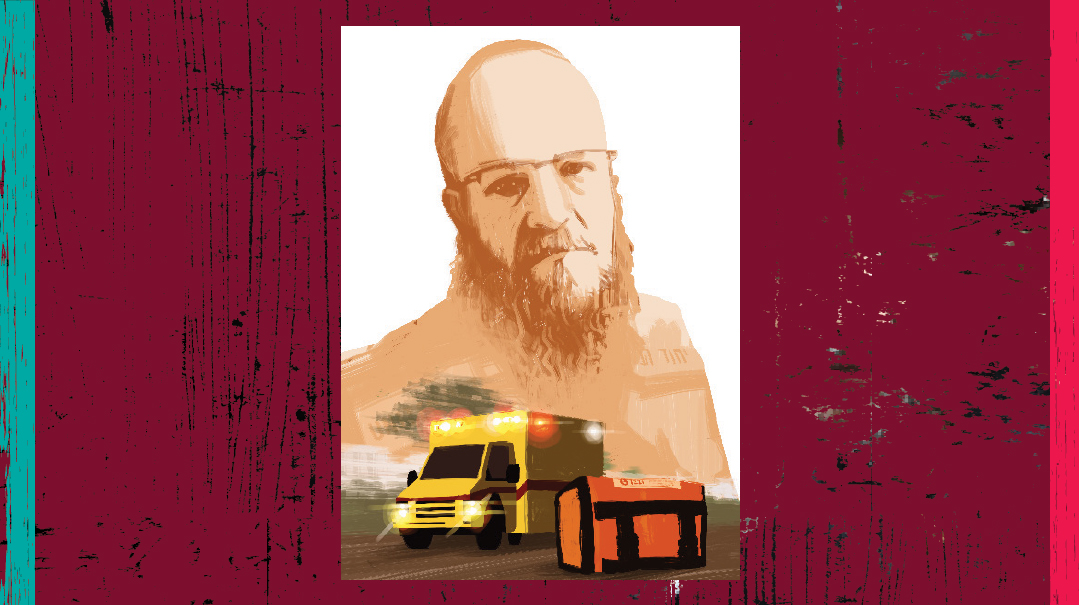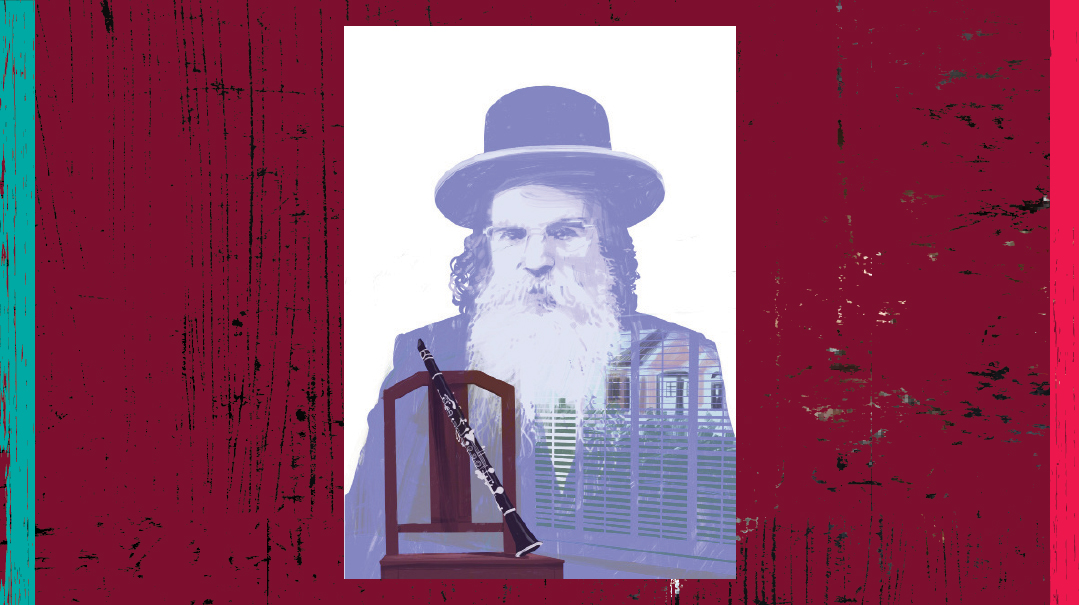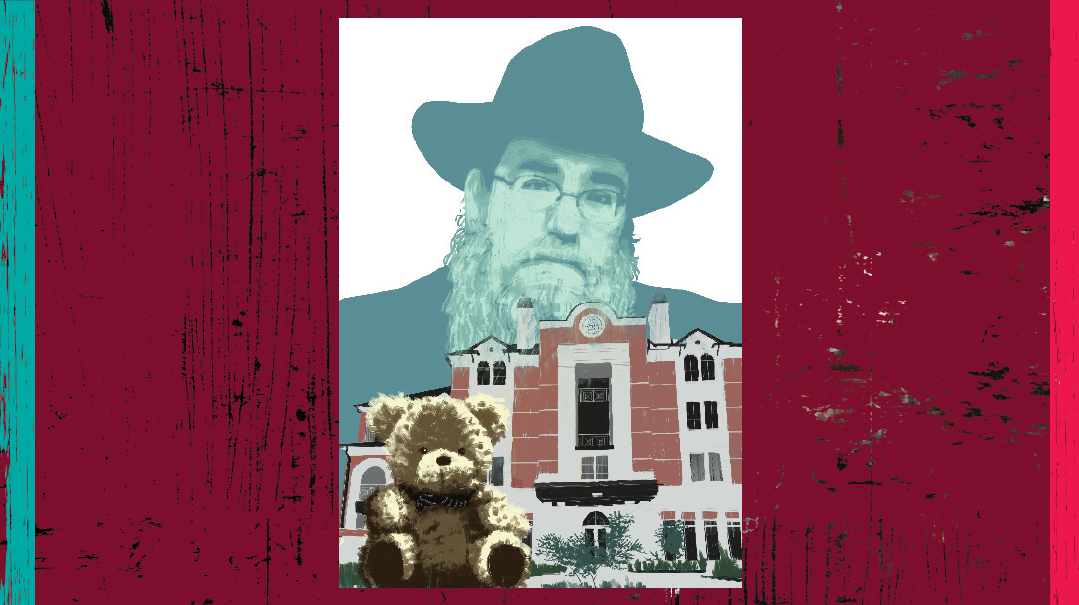Goodbye, Mother Russia
| April 5, 2020This wasn’t just a couple of Jewish Agency contacts in Moscow with an interest in moving to Israel. It was an entire secret network, an entire Orthodox community that functioned under the Soviet radar
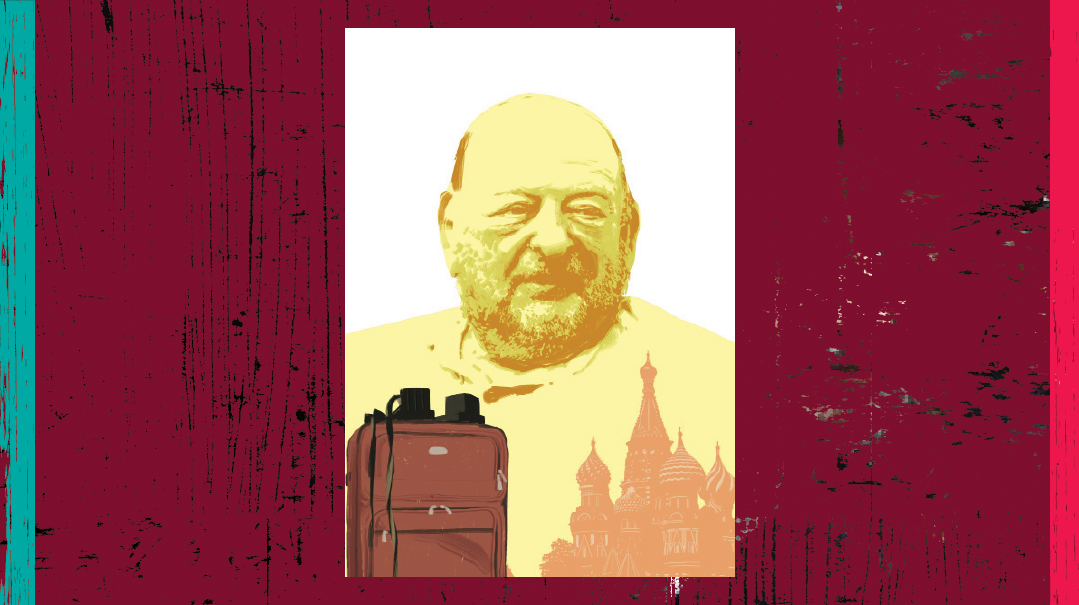
Ernie Hirsch, founder of the Russian Religious Jews (RRJ) Fund, which sent hundreds of emissaries on clandestine trips behind the Iron Curtain
It really defies logic. How did a Yekkeh-born Jewish jeweler living a quiet life in North West London — me, that is — get to lead a relief effort that sent 250 emissaries and cases full of contraband to support the Russian Jewish underground in Moscow? Honestly, I had no idea what I was getting myself into at the time, but with hindsight, I realize that entire chapter of my life was orchestrated from Above.
Back in the late 1970s, all of us Jews living in Western countries knew that Russian Jews were imprisoned behind the Iron Curtain, and those who found expression for their Judaism or wished to emigrate faced starvation and imprisonment in the Soviet gulag. Of course, there were demonstrations and protests in London on their behalf, but I was an armchair activist at most. At the time, an organization called Herut UK was looking for people to take literature and hasbarah about Israel into the USSR. In January 1980, a friend of ours who was involved in Herut approached my wife, Linda, as a potential courier, since she didn’t have that “Jewish” look.
Although Linda was not keen on the idea of a trip to Communist Russia, I was up for the adventure. Before I traveled, I met with the Herut representatives and I was briefed about the situation there, about the spiritual awakening of Russian Jews, cut off from their heritage for over half a century. Beginning in 1971, as the Soviet authorities began to court better relationships with the West, many Russian Jews took advantage of Western pressure to relax restrictions on Jewish life and immigration by applying to leave the country and emigrate to Israel. The response to those requests was anything but welcoming. These refuseniks, as they came to be known, were fired from their jobs, could rarely find work, and found themselves targets of KGB stalking. Some even had their homes bugged. Refuseniks needed an invitation from abroad just to have a miniscule hope of emigrating, but even if the invitation got past the mail censors, it could take years to process an exit visa. While they waited, they were desperate for Jewish literature, education, and support, and that was what I was asked to provide on my visit.
I was given the number of a refusenik named Rabbi Eliyahu Essas, a Moscow-based baal teshuvah who, I would soon discover, had created a veritable Torah community of several hundred fearless Jews under the noses of the KGB.
I arrived in Moscow for a week’s holiday accompanied by a friend, with a suitcase full of brochures in Ivrit and Russian. The airport officials opened my case, took away all the brochures, and told me to wait in a side room. I’m not easily intimidated, so after an hour, I left the room, went in next door, and let them know that I wanted my stuff back. “Well, you can’t have it,” was the response. But they did give me back one or two leaflets before sending me off to my hotel.
As I had been told, KGB spies waited on every floor of the hotel, and they spied on foreigners as they moved around the city, too. My companion and I called Rabbi Essas, and he directed us to meet him at a certain Metro station, very difficult to find because I don’t read Russian. We stood at the end of the platform, and there was a man coming toward us, young but impressive, full of charisma, and I said to my friend, “That must be the guy.” It was nearly 40 years ago, but the moment has stayed with me. He took us to his apartment and got right down to business, interviewing us about what we could offer his people, who were struggling to learn about their Jewish heritage and live as Jews.
To me, this was a twist in the tale. This wasn’t just a couple of Jewish Agency contacts in Moscow with an interest in moving to Israel. It was an entire secret network. It was actually, we soon found out, an entire Orthodox community that functioned under the Soviet radar. Rabbi Essas gave us more phone numbers, and each individual I spoke to gave me the number of another person. I memorized the phone numbers (it was too risky for those involved if we were caught with their phone numbers), contacted each refusenik one by one, and we met. In one crowded Metro station, then another, I met with scores of young Russian Jews. It threw me how many of them there were, and how desperate they were to know about Judaism, although both shiurim and meetings with foreigners were illegal. Honestly, I was unprepared for the first question everyone threw at me: “Why do you live in London?” They couldn’t understand how a Jew could forgo the opportunity to live in Eretz Yisrael if he’s free to buy a ticket and fly there.
I was on a group tour and I had to keep making up excuses to leave my group, who were touring Lenin’s mausoleum and watching the ballet. I was seeing a different side of the city, young Jews who had been raised in an atheist, Communist society who thirsted for details about Israel, for books on Jewish thought and manuals on Jewish law. These idealistic seekers conducted Jewish weddings and brissim at great personal risk. Many had painstakingly taught themselves Hebrew so that they could learn Chumash, and they wanted us to teach them more.
There were so many incredibly brave youngsters. One contact, Joey Koshorovski, told us on the phone to meet him at 1 a.m. outside a certain station. We found our way there, and as we emerged from the Metro station, the gates swung shut behind us. We were stranded outside on the road, in an unfamiliar part of Moscow, on a freezing, misty January night. It was so bitterly cold that I was wearing pajamas under my clothing. A drunk moaned in the bushes nearby, very possibly a KGB agent. “Where will we go if he doesn’t turn up?” I thought in a panic. And then, through the mist, I saw someone coming toward us. He pumped a fist into the Russian night and called out aloud “Shalom aleichem and baruch haba!”
Another refusenik, Michel Chanin, was a Communist youth leader. He barely knew he was Jewish, besides that the word “Ivrae” [Jew] was printed on his identity papers. What was a Jew? What did Ivrae mean? Michel went to the library to research Judaism, and it snowballed from there. He decided to go to a synagogue, where he found some elderly men listening to a shiur in Yiddish — shiurim in Russian and Hebrew were outlawed and only Yiddish shiurim were allowed, because no young people spoke the language. Michel, however, decided to learn Yiddish, and his Jewish observance grew from there — today Michel is a sofer living in Israel.
Once we returned to London, the daily heroism that I’d encountered in frozen Russia had so embedded itself that I couldn’t return to my peaceful life in suburban Hendon. We had the freedom to practice our Yiddishkeit, and the means to be able to pass it on. And Rabbi Essas needed me.
The very next morning, I turned to my community at Hendon Adass. We were a wonderful mix of balabatim, many of yekkish origin, ranging from a handful of black-hatters to Mizrachi-oriented. From the bimah at the seven thirty minyan, I told them in no uncertain terms that protests were not enough. Moscow’s Jews needed us; they were desperate for us to teach them Torah. They were ready to keep everything, but did not have the religious items they needed. I looked at my fellow Londoners, proper Jews who followed custom and routine, who certainly never dreamed of transporting contraband or risking the ire of the Russian KGB, and told them the truth that now burned within me: We couldn’t ignore those passionate young men and women in Moscow. We had to get involved practically.
The first one to offer to go to Moscow was a shul member named Yaakov (Yankel) Plitnik, and he took along Mickey Rosen, a Jewish educator. We started to send a couple of people every few weeks, women as well as men. We called it the Russian Religious Jews (RRJ) Fund, and between 1980 and 1990, the year before the Iron Curtain fell, we sent 246 shluchim on 153 trips. These emissaries faced intimidation at every turn, from passport control to KGB officers to hotel staff. Nowhere was safe — but nothing deterred them.
Our “tourists” gave shiurim, and they also filled their suitcases with whatever items were needed by our Russian brothers and sisters — from talleisim and tefillin to sheitels. And they invariably came back hungry because they had given some of their own kosher food away to the refuseniks. One pair would inform the next which Mishnah or halachic topic they had studied, so that the shiurim could continue in an orderly way. Because the refuseniks had lost their jobs and were living in dire poverty, we also sent cameras and coats that they could sell on the black market to bring in some money to feed their families. My wife remembers that every time she opened a closet, she risked having some items I’d bought for our Russian friends falling on her head.
The real breakthrough happened a year after we started, in 1981. Someone suggested that I speak to Dayan Chanoch Ehrentreu, and so I traveled to Manchester and spoke to the Rav for an hour about my Russian project. Then he stood up, left the room, and came back with his personal calendar. “When do you want me to go?” he asked.
The Rav traveled to Moscow three times to teach in Rabbi Essas’s community, and his involvement opened the door to rabbanim all over the country. Dynamic British rabbanim such as Rabbis Moshe Kupetz, Avrohom Katz, Joey Grunfeld, Sammy Goldberg, and Dayan Berel Berkowitz all took part, and our combined forces managed to reach about 300-odd families. Rabbi Essas’s community was so committed, so thirsty, that they inspired us to keep going. Dayan Berkowitz a”h once gave a shiur to a group of women for three hours. When it became far too late, and too dangerous, they only let him stop when he promised he would finish the shiur once they were in Israel. Years later, he actually made good on that promise. Most of the families eventually made aliyah, and once, when the Dayan was in Israel, they got a group together and he finished discussing the subject they had begun to learn in secret that night in Moscow.
From a jeweler with a predictable schedule and family life, I became a driven activist, dedicating every spare moment to the RRJ Fund. I fundraised incessantly to cover the trips and buy the items to smuggle in. Mezuzahs and sheitels are expensive, but if these Jews were willing to sacrifice to keep halachah, I was driven to send whatever was needed. We sent white chocolate, an unheard-of luxury in Russia, which was used to bribe prison guards — I think by Natan Sharansky. Once, the group requested that we send some saffron, so I went into a little Chinese spice store in Chinatown to get it. Later I found out that they wanted it to use as a disinfectant at clandestine brissim.
$$DROP CAP HERE$$ Over the years, people have asked me why we didn’t reach out to groups in Kiev, Minsk, or Leningrad. I think the answer is that you can’t take care of everybody. The more people involved, the more danger involved, so the Russian Jewish underground worked in several separate groups for that reason.
What we did see was incredible Divine assistance. Once they needed a chalaf, a kosher shechitah knife — not the kind of item you can pack in a suitcase. But then a friend called me saying that he was going to Moscow for a trade exhibition, and asked if he could be of any assistance. I asked what he was exhibiting, and the answer was garden tools. Well, he was in the right place at the right time to pack a knife among his tools.
One Succos, Rabbi Essas wanted lulavim. We sent a couple of ladies to Moscow with big bouquets in their hand luggage. The lulavim were hidden among the flowers. When the customs officials asked what the bouquets were for, the ladies responded that they wanted to give flowers to the concierges — actually KGB spies — who looked after each floor of the hotel. Usually, if you had a good enough excuse, it was okay. We learned that the customs officials weren’t the most educated of people — a basic excuse that made sense usually was enough to get by. A woman could say, for example, that she was bringing a tallis for her own use, and they’d let her through.
Sometimes our shluchim were detained, and often their luggage was confiscated. Wherever they went, they were followed. Rabbi Sammy Goldberg was once shoved into a closet by quick-thinking refuseniks when the KGB came sniffing around as he was giving a shiur. Another time, he was teaching Gemara to a group of young students when KGB agents showed up on the fourth-floor porch via a rope and detained him.
Rabbi Essas and his family were allowed to leave Russia in 1986, following a political deal between the World Jewish Congress and the Soviets. It was hard for him to leave, but we still helped maintain his kehillah. In 1987, after many trips, I was refused a visa to enter the USSR but I re-applied on my German passport. At the airport, I was warned to cease my activism, and a few days later, KGB agents came to my hotel and told me to pack and leave the country. That was my last personal trip, but I continued to work with Rabbi Essas’s community for another three years, until nearly all of them were able to emigrate.
Those ten years taught me the lesson of my life. I always saw those Jews I’d helped out not as prisoners, but free people who happened to be living in a prison-like society. And I considered it the greatest privilege to play a role in their stories. Because they knew they weren’t Soviet prisoners, but part of a great big Jewish family. What could be a bigger zechus than that?
(Originally featured in Mishpacha, Issue 806)
Oops! We could not locate your form.






